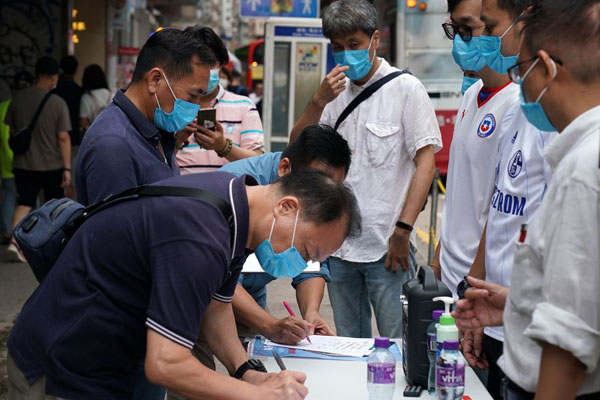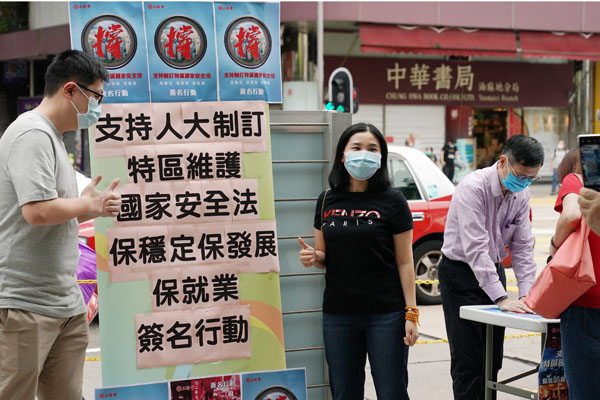Mobs, Washington prove why Hong Kong urgently needs national security law

Residents sign in a street campaign in support of national security legislation for Hong Kong Special Administrative Region (HKSAR) in Hong Kong, south China, May 23, 2020. (Xinhua/Li Gang)
No country would allow the same kind of riots and lawlessness in Hong Kong to occur in their own territory. Neither will China.
HONG KONG -- Once again a scene of indefensible, horrific violence has unfolded on the streets of Hong Kong in broad daylight.
The innocent victim this time was a young woman who, after being brutally knocked down, was dragged along the ground and viciously punched and kicked by a group of black-clad men and women wearing face masks.
She was barbarically beaten by the so-called "freedom fighters" because she was trying to clear the barricades blocking the road to let the cars get through, video footage that emerged online showed.
On the same day, a 41-year-old man, identified afterward as a lawyer, was assaulted and chased down the street by a mob for complaining about their unlawful behavior. While he was being savagely beaten up, a group of rioters opened umbrellas to cover the gruesome assault.
The violent acts, abhorrent in any civil society, happened on Sunday in Hong Kong after the top legislature announced a draft decision to introduce national security legislation for the city. Masked radicals flocked to the streets on Hong Kong Island, blocking roads, dismantling railings, trashing shops and setting fires.
Not surprisingly, none of those atrocities and law-breaking activities caught the attention of politicians in Washington, whose sole interest lies in blaming, attacking and smearing China.
In one of the most shocking remarks made by a U.S. politician, congressman Scott Perry introduced a so-called "Hong Kong Freedom Act," which, he explained, "authorizes the President of the United States to recognize Hong Kong as a separate, independent country."
Absurd and ignorant as the remarks are, such reactions of Perry and the like, undoubtedly, further embolden the rioters and their hidden handlers in Hong Kong. The collusion between the two sides, ironically, perfectly highlights why China indeed needs the national security legislation in Hong Kong.

Residents attend a street campaign in support of national security legislation for Hong Kong Special Administrative Region (HKSAR) in Hong Kong, south China, May 23, 2020. (Xinhua/Li Gang)
Under the "one country, two systems," Hong Kong, as a special administrative region of China, has a high degree of autonomy and retains its own capitalist system and lifestyle. However, first and foremost, Hong Kong is part of China and is under the overall jurisdiction of the Chinese central government.
Every country has a right and a duty to protect its national security. To suggest that China does not have the same right to legislate to protect national security in Hong Kong shows a double standard and hypocrisy.
The absence of national security law in Hong Kong has long been taken advantage of by local and foreign anti-China forces. Activities jeopardizing national security have become increasingly rampant in Hong Kong.
During months of social unrest last year, rioters besieged government and legislative buildings, trashed metro stations, banks and stores and assaulted innocent residents, plunging Hong Kong into chaos and deep economic recession.
Those who claim to be acting in Hong Kong's best interests turn a blind eye to the violence and its traumatic consequences and focus purely on hyping up anti-China sentiments and stoking fear and chaos in Hong Kong. By doing so, their true, deceitful intentions are exposed.
No country would allow the same kind of riots and lawlessness in Hong Kong to occur in their own territory. Neither will China.
The legislation in the pipeline is aimed at rescuing Hong Kong from being ruined, ensuring the "one country, two systems" stays on track and guaranteeing a stable future for Hong Kong.
Those who truly value and cherish the Pearl of the Orient should rest assured that the legislation will better protect and secure the rights and freedoms of law-abiding Hong Kong residents. Only those who attempt to use Hong Kong as a political pawn for their own political or economic gains should feel uneasy.
The Chinese government is rock-firm in protecting national sovereignty, security and its development interests. Anyone trying to use Hong Kong as a bargaining chip to contain China, split the country, or subvert state power, is either ignorant or self-deceiving.
- Top legislature schedules session for Wednesday
- China's top legislator meets with British PM
- China's top legislator holds talks with president of Senegalese National Assembly
- China's top legislator meets with Finnish PM
- Top legislator calls for advancing people's congress work in line with Party, State priorities



